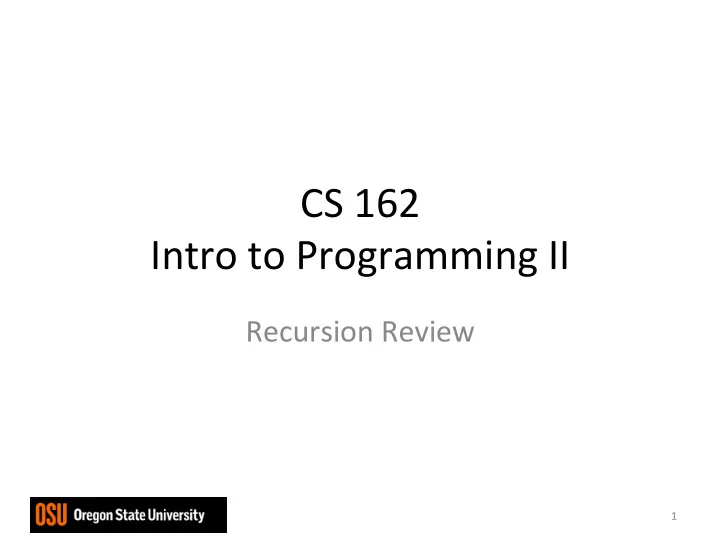

CS ¡162 ¡ Intro ¡to ¡Programming ¡II ¡ Recursion ¡Review ¡ 1 ¡
Defini:on ¡ • Recursion ¡is ¡a ¡func:on ¡that ¡calls ¡itself. ¡ ¡ ¡ • The ¡factorial ¡func:on ¡is ¡easily ¡defined ¡ recursively. ¡ ¡ ¡ – Fact(0) ¡= ¡1 ¡ – Fact(n) ¡= ¡Fact(n-‑1) ¡* ¡n ¡ ¡ ¡
Defini:on-‑ ¡Details ¡ ¡ • A ¡technique ¡where ¡a ¡func:on ¡calls ¡itself ¡with ¡a ¡ simpler ¡version ¡of ¡the ¡input ¡ – More ¡than ¡just ¡a ¡programming ¡technique. ¡We ¡use ¡ it ¡in ¡Computer ¡Science ¡as: ¡ • a. ¡A ¡way ¡to ¡define ¡things ¡ • b. ¡A ¡way ¡to ¡solve ¡problems ¡using ¡divide ¡and ¡conquer ¡ – Can ¡prove ¡correctness ¡of ¡recursive ¡func:ons ¡– ¡use ¡ induc:on! ¡
Defini:on-‑ ¡Details ¡ ¡ • Every ¡recursive ¡solu:on ¡has: ¡ – A ¡Base ¡Case ¡(when ¡to ¡stop!) ¡ • What ¡happens ¡if ¡you ¡forget ¡the ¡base ¡case? ¡ • Infinite ¡loop. ¡Out ¡of ¡memory ¡because ¡too ¡many ¡ ac:va:on ¡records. ¡ – A ¡Recursive ¡Step ¡(calling ¡itself) ¡ • Deferring ¡responsibility: ¡assumes ¡the ¡func:on ¡you ¡call ¡ does ¡the ¡right ¡thing ¡ • The ¡recursive ¡call ¡operates ¡on ¡“smaller” ¡inputs ¡(smaller ¡ in ¡some ¡sense) ¡ ¡
How ¡to ¡Write ¡a ¡Recursive ¡Func:on ¡ • Iden:fy ¡the ¡base ¡case. ¡ – This ¡tells ¡your ¡program ¡when ¡to ¡stop ¡and ¡is ¡the ¡ simplest ¡input ¡to ¡your ¡program ¡ • Iden:fy ¡the ¡recursive ¡step. ¡ – Look ¡for ¡places ¡where ¡the ¡same ¡computa:on ¡occurs ¡ repeatedly ¡as ¡the ¡problem ¡is ¡solved. ¡ – Each ¡:me ¡the ¡computa:on ¡is ¡repeated, ¡the ¡method ¡ works ¡on ¡a ¡simpler ¡version ¡ of ¡the ¡problem ¡ • What ¡happens ¡if ¡the ¡next ¡call ¡is ¡NOT ¡on ¡a ¡smaller ¡ or ¡more ¡simple ¡version ¡of ¡the ¡problem? ¡ ¡ ¡ ¡
How ¡to ¡Think ¡Recursively ¡ Using ¡the ¡factorial ¡func:on ¡ • The ¡factorial ¡func:on ¡simply ¡returns ¡the ¡ number ¡mul:plied ¡by ¡all ¡previous ¡non-‑ nega:ve ¡integers. ¡ ¡ ¡ • Find ¡the ¡base ¡case. ¡ ¡ • 0 ¡is ¡the ¡star:ng ¡point ¡so ¡Fact(0) ¡= ¡1. ¡ ¡ ¡ • Find ¡the ¡recursive ¡case. ¡ ¡ ¡ – For ¡any ¡n, ¡smaller ¡would ¡be ¡n-‑1. ¡ ¡ ¡ – So ¡we ¡have ¡Fact(n) ¡= ¡Fact(n-‑1) ¡* ¡n. ¡ ¡
Recursion ¡vs ¡Itera:on ¡ • Both ¡are ¡forms ¡of ¡repe::on ¡ • Each ¡:me ¡through ¡a ¡step ¡of ¡recursion ¡you ¡ have ¡a ¡func:on ¡call ¡ – This ¡means ¡you ¡have ¡the ¡overhead ¡of ¡the ¡call ¡ stack ¡and ¡other ¡OS ¡processes ¡ • Each ¡:me ¡through ¡a ¡step ¡of ¡itera:on ¡you ¡just ¡ execute ¡that ¡many ¡lines ¡of ¡code ¡ • So ¡why ¡use ¡recursion? ¡ ¡ ¡
Why ¡Recursion? ¡ • Some ¡opera:ons ¡are ¡easier ¡to ¡describe ¡than ¡to ¡ program. ¡ ¡ ¡ • Consider ¡the ¡towers ¡of ¡Hanoi. ¡ ¡ ¡ – To ¡move ¡the ¡bo`om ¡disk ¡you ¡need ¡to ¡move ¡n-‑1 ¡disks ¡ above ¡it. ¡ ¡ ¡ – To ¡move ¡the ¡(n-‑1)th ¡disk ¡you ¡need ¡to ¡move ¡the ¡n-‑2 ¡disks ¡ above ¡that. ¡ ¡ ¡ – … ¡ – To ¡move ¡the ¡last ¡disk ¡you ¡just ¡move ¡it ¡to ¡an ¡empty ¡peg. ¡ ¡ ¡ • As ¡already ¡men:oned, ¡we ¡can ¡use ¡induc:on ¡to ¡prove ¡ the ¡correctness ¡of ¡recursive ¡algorithms ¡ ¡ ¡
You ¡Need ¡to ¡be ¡Smart ¡ • A ¡common ¡example ¡is ¡the ¡Fibonacci ¡Numbers ¡ • This ¡func:on ¡is ¡doubly ¡recursive ¡so ¡has ¡2 ¡ func:on ¡calls ¡for ¡each ¡step!! ¡ ¡ ¡ • Think ¡about ¡what ¡this ¡means? ¡ ¡ ¡ – Each ¡recursive ¡call ¡is ¡2 ¡more ¡func:on ¡calls ¡ ¡ – Except ¡for ¡the ¡base ¡case ¡ ¡ – Essen:ally ¡3 ¡func:ons ¡for ¡each ¡step ¡of ¡itera:on! ¡ ¡
You ¡Need ¡to ¡be ¡Smart ¡II ¡ • Mutual ¡recursion, ¡consider ¡this: ¡ int ¡f() ¡{… ¡g()…}; ¡ ¡ int ¡g() ¡{… ¡f()…}; ¡ ¡ • Maybe ¡be ¡hidden ¡ ¡ int ¡f() ¡{… ¡g()…}; ¡int ¡g() ¡{… ¡h()…}; ¡ ¡ int ¡h() ¡{… ¡j()…}; ¡int ¡j() ¡{… ¡f()…}; ¡ ¡ • May ¡be ¡a ¡problem ¡if ¡either ¡func:ons ¡base ¡ case ¡can ¡be ¡changed ¡by ¡the ¡other ¡func:on! ¡ ¡ ¡
The ¡Nightmare? ¡ ¡ ¡ ¡ int ¡f() ¡{… ¡g(); ¡h()…}; ¡ ¡ int ¡g() ¡{… ¡h(); ¡J()…}; ¡ ¡ int ¡h() ¡{… ¡j(); ¡f()…}; ¡ ¡ int ¡j() ¡{… ¡f(); ¡g()…}; ¡ ¡ ¡
Tail ¡Recursion ¡ • Tail ¡recursive: ¡if ¡there ¡are ¡no ¡pending ¡ opera:ons ¡to ¡be ¡performed ¡on ¡return ¡from ¡a ¡ recursive ¡call ¡ • Tail ¡recursive ¡func:ons ¡return ¡the ¡value ¡of ¡the ¡ last ¡recursive ¡call ¡as ¡the ¡value ¡of ¡the ¡func:on. ¡ • Some ¡compilers ¡will ¡actually ¡convert ¡tail ¡ recursive ¡func:ons ¡to ¡itera:on ¡to ¡avoid ¡the ¡ stack ¡call ¡overhead. ¡ ¡g++ ¡will ¡with ¡op:miza:on ¡ set. ¡ ¡
Not ¡Tail ¡Recursive ¡ public ¡long ¡rfactorial ¡(int ¡n) ¡{ ¡ ¡ ¡ ¡ ¡ ¡if ¡(n ¡== ¡1) ¡ ¡ ¡ ¡ ¡ ¡ ¡ ¡ ¡ ¡ ¡return ¡1; ¡ ¡ ¡ ¡ ¡ ¡else ¡ ¡ ¡ ¡ ¡ ¡return ¡n ¡ * ¡rfactorial(n-‑1); ¡// ¡ * ¡is ¡a ¡pending ¡ ¡ ¡ ¡ ¡opera:on ¡aker ¡recursive ¡call ¡ } ¡
Tail ¡Recursive ¡ public ¡long ¡factorialHelper ¡(int ¡n, ¡int ¡result) ¡{ ¡ ¡ ¡ ¡ ¡ ¡if ¡(n ¡== ¡1) ¡ ¡ ¡ ¡ ¡ ¡ ¡ ¡ ¡ ¡ ¡return ¡result; ¡ ¡ ¡ ¡ ¡ ¡else ¡ ¡ ¡ ¡ ¡ ¡return ¡factorialHelper(n-‑1,n*result); ¡ } ¡ public ¡long ¡factorial(int ¡n) ¡{ ¡ ¡ ¡ ¡ ¡ ¡return ¡factorialHelper(n,1); ¡ } ¡
Recommend
More recommend